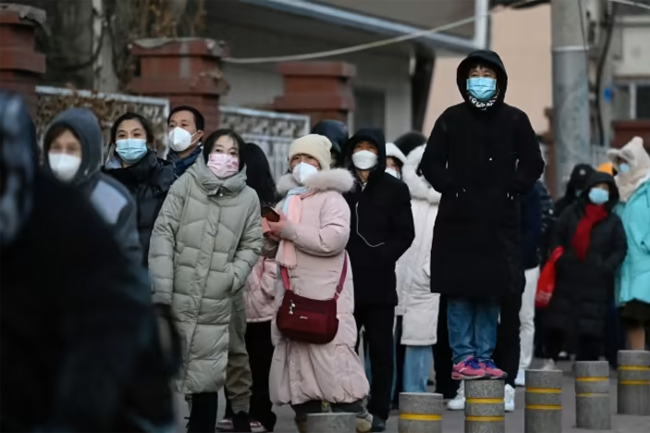China rolls back strict Covid-19 rules after protests
December 7, 2022 01:45 pm
China has rolled back its most severe Covid policies - including forcing people into quarantine camps - just a week after landmark protests against the strict controls.
People with Covid can now isolate at home rather than in state facilities if they have mild or no symptoms.
They also no longer need to show tests for most venues, although a PCR test is needed for schools and hospitals.
Citizens have expressed relief but also concern about the sudden changes.
“Finally! I will no longer worry about getting infected or being taken away as a close contact,” one person wrote on Chinese social media.
Another said: “Can anyone explain to me what’s happening? Why is the change all of a sudden and so major?”
The raft of changes show China is finally moving away from its zero-Covid policy and looking to “live with the virus” like the rest of the world. This comes as the country is grappling with its biggest wave of infections - over 30,000 each day.
Some users online have questioned the accelerated opening-up - “The medical system will be overwhelmed and many elderly would be infected. It begins now,” one user wrote.
But many others rejoiced at the loosening of a policy that had controlled their lives for nearly three years.
Until now, China had forced people with Covid and anyone who was a close contact to go to quarantine camps. This policy had been deeply unpopular because it separated families and removed people from their homes.
Videos all year have shown guards dragging people out of their homes, including viral footage from Hangzhou last week which showed a man fighting off officials.
On Wednesday, the National Health Commission announced a swathe of other measures, including:
• Restrictions like lockdowns should be applied to more precisely identified areas - for example certain buildings, units and floors as opposed to whole neighbourhood or city-wide lockdowns
• High-risk areas should come out of lockdown in five days if no new cases are found
• Schools should remain open if there is no wider campus outbreak
The new guidelines also included a strict ban on blocking fire exits and doors and said people had to be able to access emergency medical treatment and escape routes unhindered by pandemic control measures.
It follows reports of people being locked into their homes and buildings being sealed under lockdown measures.
The recent protests were triggered by a deadly fire in the western Xinjiang region - critics said the victims had been unable to escape the building because of lockdown measures but Beijing denies this.
There have also been repeated reports of delays to emergency medical care for people in locked down areas.
On Wednesday, authorities also stressed the need to accelerate the vaccination of elderly people.
“All localities should adhere to.... focus on improving the vaccination rate of people aged 60-79, accelerating the vaccination rate of people aged 80 and above, and making special arrangements,” the National Health Commission said.
The loosening of measures come after the country saw its biggest protests in decades. Last week, crowds took to streets in several cities to criticise lockdowns and pandemic restrictions.
Protests in some places also escalated into direct criticism of President Xi Jinping and the Chinese Communist Party - a significant display of defiance given the country’s intolerance for political dissent.
Since those protests on 24-26 November, Chinese authorities had begun to release some cities from lockdown. Officials had also begun to tone down language around the dangers of Covid.
The country’s vice-premier, Sun Chunlan, flagged last week that China was entering “a new situation” in the pandemic and the virus’ ability to cause disease was weakening.
Experts have warned any easing of zero-Covid in China would have to be done slowly - as the country of 1.4 billion people could see a huge jump in cases that could overwhelm its healthcare system.
Speeding up vaccination of its elderly population is key, health experts say.
“The main way for China to exit Covid with the least damage is via vaccination and three doses of vaccination is a must,” Prof Ivan Hung at Hong Kong University told the BBC earlier this week.
“Hopefully before Chinese New Year [in January 2023] as there will be a large movement of the population travelling and returning home,” he added.
Source: BBC












